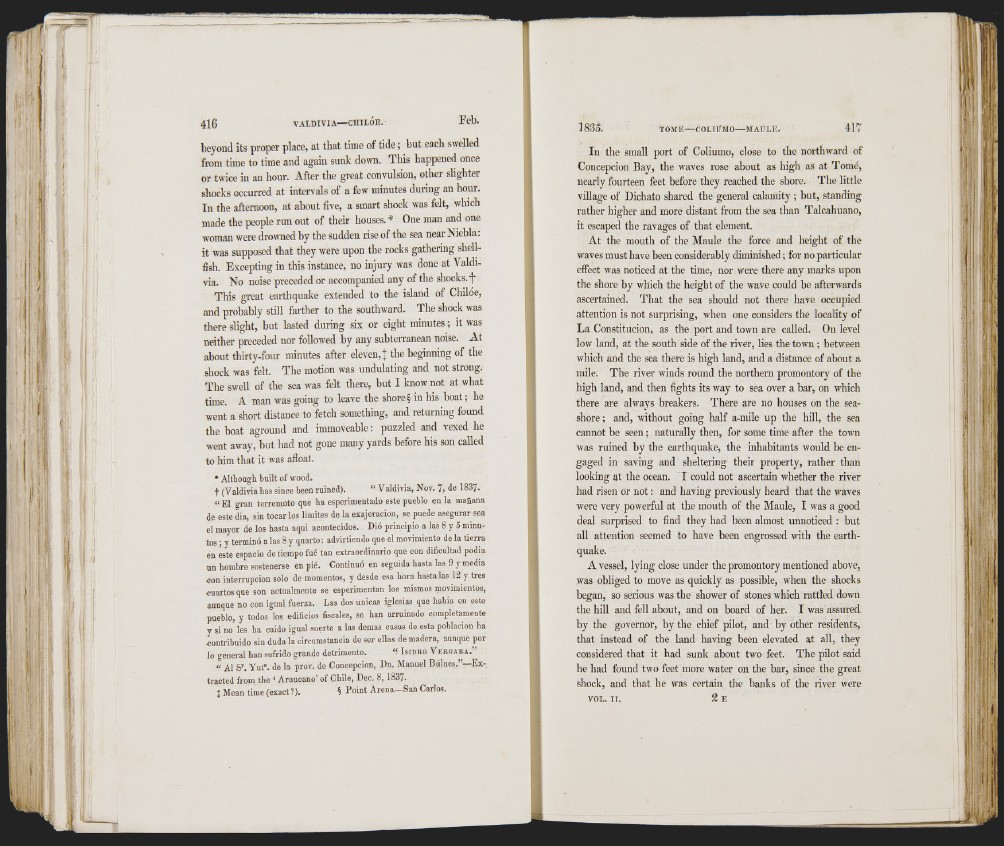
VALDIVIA CHILÓE.
■ V
M
n i
r
H ■ I
beyond its propel- place, at that time of tide; but each swelled
from time to time and again sunk down. This happened once
or twice in an hour. After the great convulsion, other slighter
shocks occurred at intervals of a few minutes during an hour.
In the afternoon, at about five, a smai-t shock was felt, which
made the people run out of their houses. * One man and one
woman were drovmed by the sudden rise of the sea near Niebla;
it was supposed that they were upon the rocks gathering shellfish.
Excepting in this instance, no injury was done at Valdivia.
No noise preceded or accompanied any of the shocks.-f
This great earthquake extended to the island of Chilóe,
and probably still farther to the southward. The shock was
there slight, but lasted during six or eight minutes; it was
neither preceded nor followed by any subterranean noise. At
about thirty-four minutes after eleven,] the beginning of the
shock was felt. The motion was undulating and not strong.
The swell of the sea was felt there, hut I know not at what
time. A man was going to leave the shore § in his boat; he
went a short distance to fetch something, and returning found
the boat aground and immoveable: puzzled and vexed he
went away, but had not gone many yards before his son called
to him that it was afloat.
• Although built of wood.
t (Valdivia has since been ruined). “ Valdivia, Nov. 7, de 1837.
“ El gran terremoto que ha esperimentado este pueblo en la mañana
de este dia, sin tocarlos limites de la exajeracion, se puede asegurar sea
el mayor de los hasta aqui acontecidos. Dió principio a las 8 y 5 minutos
; y terminó a las 8 y quarto: advirtiendo que el movimiento de la tierra
en ’este espacio de tiempo fue tan extraordinario que con dificultad podía
un hombre sostenerse en pié. Continuó en seguida hasta las 9 y media
con interrupción solo de momentos, y desde esa hora hasta las 12 y tres
cuartos que son actualmente se esperimentan los mismos movimientos,
aunque no con igual fuerza. Las dos únicas iglesias que habia en este
pueblo, y todos los edificios fiscales, se han arruinado completamente
y si no les ha caído igual suerte a las demas casas de esta población ha
contribuido sin duda la cireumstancia de ser ellas de madera, aunque por
lo general han sufrido grande detrimento. “ I s id r o V e r o a b a . ”
“ Al S*’. Ynt°. de la prov. de Concepcion, Dn. Manuel Búlnes.”—Extracted
from the ‘ Araucano’ of Chile, Dec. 8, 1837.
J Mean time (exact ?). § Point A rena—San Carlos.
In the small port of Coliumo, close to the northward of
Concepcion Bay, the waves rose about as high as at Tomé,
nearly fourteen feet before they reached the shore. The little
village of Dichato shared the general calamity; but, standing
rather higher and more distant from the sea than Talcahuano,
it escaped the ravages of that element.
At the mouth of the Maule the force and height of the
waves must have been considerably diminished; for no particular
effect was noticed at the time, nor were there any marks upon
the shore by which the height of the wave could be afterwards
ascertained. That the sea should not there have occupied
attention is not surprising, when one considers the locality of
La Constitución, as the port and town are called. On level
low land, at the south side of the river, lies the town ; between
which and the sea there is high land, and a distance of about a
mile. The river winds round the northern promontory of the
high land, and then fights its way to sea over a bar, on which
there are always breakers. There are no houses on the seashore
; and, without going half a-mile up the hill, the sea
cannot be seen; naturally then, for some time after the town
was ruined by the earthquake, the inhabitants would be engaged
in saving and sheltering their property, rather than
looking at the ocean. I could not ascertain whether the river
had risen or not: and having previously heard that the waves
were very powerful at the mouth of the Maule, I was a good
deal surprised to find they had been almost unnoticed : but
all attention seemed to have been engrossed with the earthquake.
A vessel, lying close under the promontory mentioned above,
was obliged to move as quickly as possible, when the shocks
began, so serious was the shower of stones which rattled down
the hill and fell about, and on board of her. I was assured
by the governor, by the chief pilot, and by other residents,
that instead of the land having been elevated at all, they
considered that it had sunk about two feet. The pilot said
he had found two feet more water on the bar, since the great
shock, and that he was certain the banks of the river were
VOL. I I . 2 E
Ij i\
Cl :ii
ill!
I U i '
I 'I
il • : V